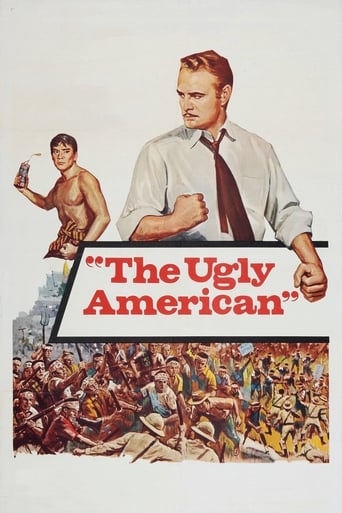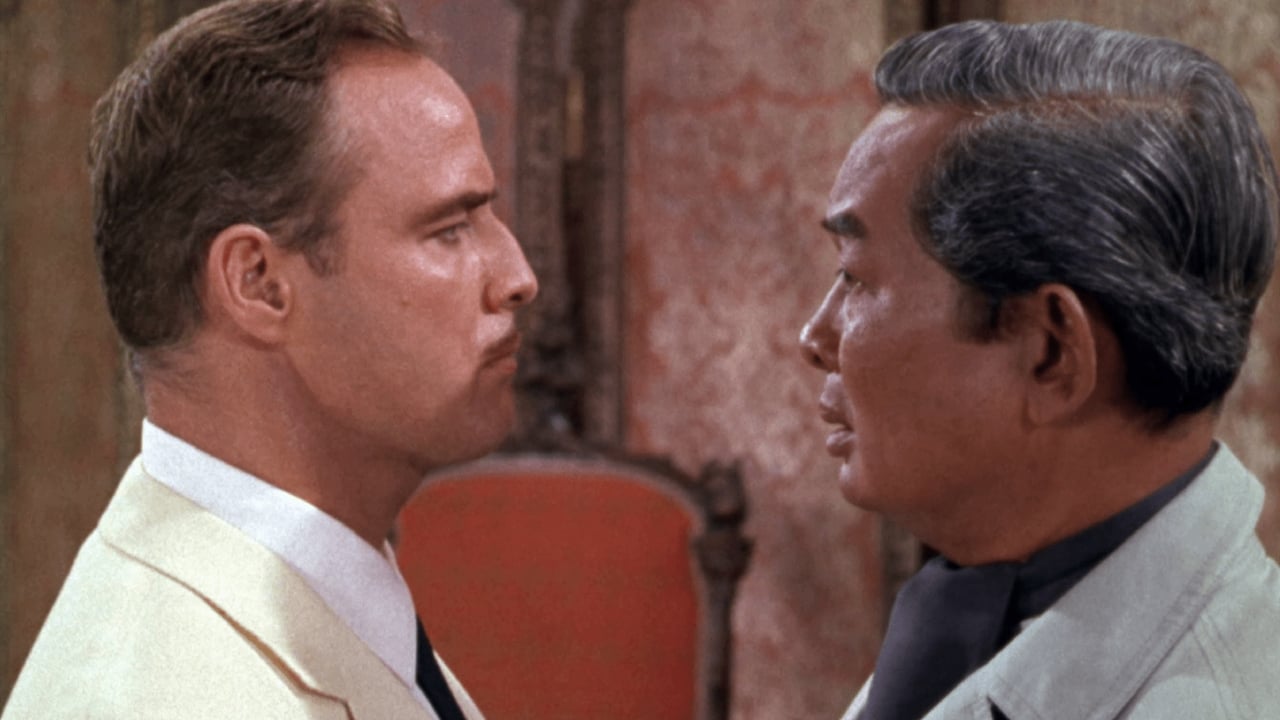rodrig58
Marlon Brando, young, convincing, natural in everything he does. The story is strictly political, unfortunately. I would have wanted to be a strong love story, not just anti-communist propaganda.If I had to describe Brando musically, I would call him Beethoven of the screen, only him and Gian Maria Volontè (to whom Coppola offered first the title role in The Godfather) they
had that unique force, woven with infinite abisal sensitivity. The film is only worth seeing for Brando.
jeremy3
Brando appeared a bit over the top in films like The Wild Ones, On The Waterfront, The Godfather, and Apocalypse Now. Having just seen this film for the first time, I compare this role to The Chase (1966) where Brando plays a sheriff in a Texas town humbled by his duties. In The Ugly American, based upon the 1958 novel, Brando plays an LBJ like journalist who becomes ambassador to the fictitious southeast Asia country of Sarkan (but very clearly really Vietnam).
The film was made while JFK was President, but there are great similarities to Brando's Ambassador MacWhite and LBJ. Brando plays a moderate to liberal Democrat who faces an uphill confirmation hearing due to the skepticism of hawkish Senator Brenner (Judson Laire). Laire is a virulent anti communist who is both wrongly and rightly concerned that a journalist who just fought the Japanese in WWII in Sarkan has any experience to be the ambassador of the country of Sarkan in the late 1950s.
The main argument MacWhite makes is that he is good friends with Deung (Eiji Okada), the powerful nationalist opposition leader in Sarkan. MacWhite is confirmed but he is nearly killed by a mob that greets him at the airport. MacWhite may be liberal leaning politically, but he is still 100% a former military man. MacWhite naively believes that it is all about America being the "good" force for progress against "Communism".
MacWhite meets his old friend Deong, but then foolishly starts an argument over the value of building the "freedom road" to the north border of the country, which MacWhite sees as progress, and Deong (with wide popular support) sees as American imperialism. MacWhite denounces Deong as a "communist" and they become enemies.
MacWhite insists on continuing the building of the "freedom road" to the border with the communist neighbors, despite several people telling him that it will just provoke the paranoia of the communists and be seen by the majority of Sarkans will resist it as cultural and economic imperialism. Eventually, his stubbornness and persistence results in a civil war.
Prime Minister Sai (Kukrit Pramo) demonstrates that he is a very wise leader, in contract to MacWhite's foolhardy arrogance. Prime Minister Sai finally convinces MacWhite that Deong is not a communist, Deong himself will be betrayed by the communists, and that Sarkan may fall to the Communists unless the U.S. military intervenes.
I really liked this movie, because Brando's character does realize, albeit probably too late, the errors of his thinking. MacWhite saw everything in "black" and "white" and failed to see what was truly going on in Sarkan. MacWhite tries too late to warn the American people to go back to the principles of our own revolution and show the World that we are for these principles, not lecturing other cultures about how to live.
jr-565-26366
This movie tells the story of the cost of failed foreign policy decisions in countries that were contested during the Cold War. Filmed in 1963, it predicts what eventually happened not only in Southeast Asia, but in Central America and the Middle East. This movie used to be shown to classes at the US Army's JFK Center for Unconventional Warfare as late as the mid-1990s as an example of the country team operating in a country under siege.In 2003, a re-mastered and restored version of this movie opened the movie festival at Port Townsend, WA with both the director and screenwriter in attendance. The director stated that both he and Marlon Brando had considered making a movie about American diplomacy since the mid-1950s but never got any concepts off the ground until the novel was published in 1958. Even then, there were still issues to contend with to include the lack of support from the State Department and the Government of Thailand. It took JFK's personal intervention to get the movie made. JFK allegedly sent a copy of the book to every member of the Senate.This movie portrays the continuing mistake we made, and continue to make, when dealing with insurgencies. During the Cold War we considered any movement against an allied or friendly country as a communist inspired movement rather than a nationalistic one or one motivated by a need for justice. We ended up protecting and supporting unjust and oppressive regimes simply because they were combating a communist movement. The US Ambassador, played by Marlon Brando makes this same mistake. The movie also illustrates accurately how the Communists operated to stir up trouble and strife by creating and celebrating martyrs and casting American good intentions as evil and self-serving. The movie demonstrates how they hijacked and dominated these movements by first offering support, then insidious infiltration of and displacing the genuine nationalist leaders with communist or socialistic ones.Several scenes in this movie are so vivid they are unforgettable. The airport demonstration that turns into a riot is unusually realistic for a movie of this period. I should know; I've seen more than my fair share of riots in Asia and Central America. The attack on the opening ceremony of the Freedom Road is also realistically played out. The eerie silence right after the attack is suddenly interrupted by wailing from the wounded. As the Ambassador's wife tries to tend to one of the casualties, a relief worker walks by and casually tells her, "Don't bother, she's dead." The chaos at the besieged embassy near the end of the movie opens with the face of a bewildered and frightened child as US nationals scramble in the background to leave a country descending into hell.I believe Marlon Brando's performance as the American Ambassador is one his best portrayals. The scene when he realizes that he misjudged the whole situation with his friend Deong is gut wrenching. In the presence of his embassy subordinate and the Sarkhan Prime Minster, not only does he realize that he was wrong, but his diplomatic failure has committed his country to a needless, avoidable war. But Mr. Brando is almost up staged by his Asian co-stars. The articulate Thai actor, Kukrit Pramoj, who plays the Prime Minister of Sarkhan and who later became the real Prime Minister of Thailand after the military junta was tossed out in 1975. The scene where he out maneuvers the American Ambassador and directs his attention to, "the gentleman with the lump on his head" is priceless. And Japanese actor Eiji Okada, who plays the Ambassador's comrade in arms from their OSS days who now leads the revolution against the government the United States is supporting.The movie ends in a scene that captures the typical mood of the American people when it comes to all things dealing with foreign policy. In the decades since the end of World War II, thousands of American diplomats, servicemen and women, aid workers and missionaries have died anonymous deaths trying to bring democracy and a higher standard of living to jerkwater countries around the world. Yet the American people seemed to be indifferent to these sacrifices. Instead, all we seem to care about is the next episode of "American Idol" or the newest hi-tech gadgets or the latest news about the rich and famous. The ending scene of this movie made over 50 years ago is still relevant and true to this day.
Lee Eisenberg
"The Ugly American" was released right before the Vietnam War started (depending on which stage of it), and now it seems more relevant than ever. Harrison MacWhite (Marlon Brando) becomes ambassador to the Southeast Asian nation of Sarkhan, which is on the verge of civil war between the Communists and the pro-US government. In Sarkhan, MacWhite begins to suspect that US intervention in this country might be prompting people to rebel. While he refuses to accept it, the situation becomes more and more tense, and MacWhite's officially neutral position becomes less and less sustainable.You can't say for certain what the movie's political message is, but we might take MacWhite's speech at the end as a good reminder. Either way, this is one of the many movies that showed how great an actor Marlon Brando was.


 AD
AD



